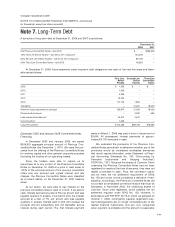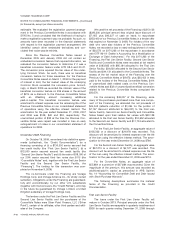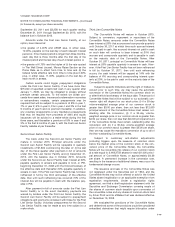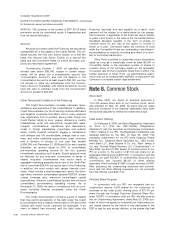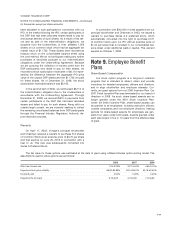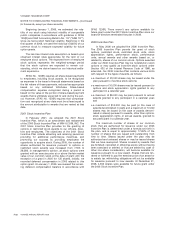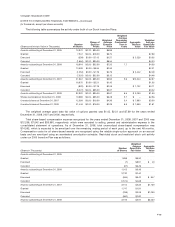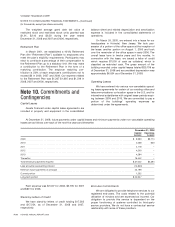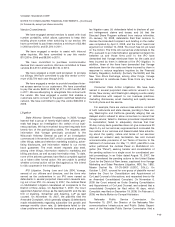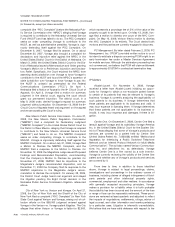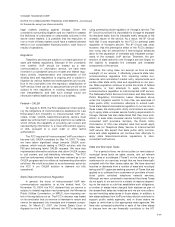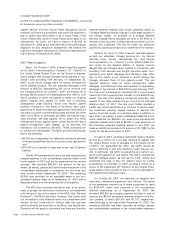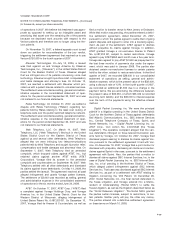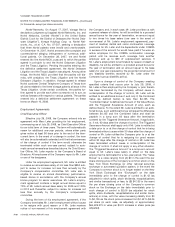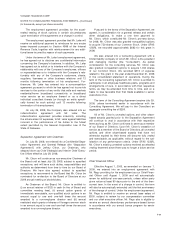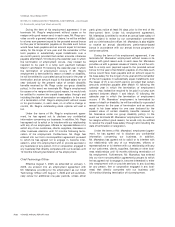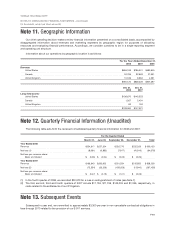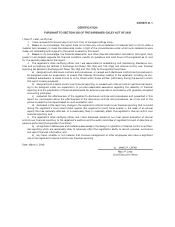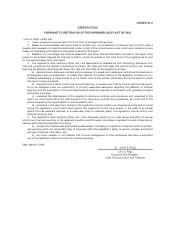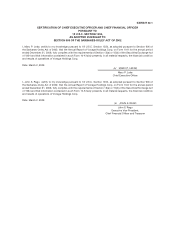Vonage 2008 Annual Report Download - page 87
Download and view the complete annual report
Please find page 87 of the 2008 Vonage annual report below. You can navigate through the pages in the report by either clicking on the pages listed below, or by using the keyword search tool below to find specific information within the annual report.V
O
NA
G
EH
O
LDIN
GS CO
RP
.
N
O
TE
S
T
OCO
N
SO
LIDATED FINAN
C
IAL
S
TATEMENT
S
—
(C
ontinued
)
(
In thousands, except per share amounts
)
legal matters pending against Vonage.
G
iven th
e
uncerta
i
nty surroun
di
n
gli
t
ig
at
i
on an
d
our
i
na
bili
ty to assess
th
e
lik
e
lih
ood of a fa
v
o
r
ab
l
eo
r
u
n
fa
v
o
r
ab
l
eou
t
co
m
e
in th
e
above noted matters, it is
p
ossible that the resolution o
f
o
n
eo
rm
o
r
eo
fth
ese
m
a
tt
e
r
s cou
l
d
h
a
v
ea
m
a
t
e
ri
a
l
ad
v
e
r
se
e
ff
ect on our consolidated
f
inancial position, cash
f
lows o
r
r
esults of o
p
erations.
Re
g
ulatio
n
T
elephony services are subject to a broad spectrum o
f
state and federal re
g
ulations. Because of the uncertainty
over whether VoIP should be treated as a tele-
communications or information service
,
we have bee
n
involved in a substantial amount of state and federal re
g
u-
lator
y
activit
y
. Implementation and interpretation o
f
th
e
ex
i
st
i
ng
l
aws an
d
regu
l
at
i
ons
i
s ongo
i
ng an
di
ssu
bj
ect t
o
liti
g
ation by various federal and state a
g
encies and courts
.
D
ue to the uncertainty over the regulatory classi
f
ication o
f
V
o
IP
serv
i
ce
,
t
h
ere can
b
e no assurance t
h
at we w
ill
not
be
su
bj
ect to new re
g
u
l
at
i
ons or ex
i
st
i
n
g
re
g
u
l
at
i
ons un
d
e
r
new interpretations, and that such change would no
t
i
ntro
d
uce mater
i
a
l
a
ddi
t
i
ona
l
costs to our
b
us
i
ness
.
Federal—
C
ALE
A
O
nAu
g
ust 5, 2005, the F
CC
released an
O
rder extend-
in
g
the obli
g
ations of Communications Assistance for La
w
E
nforcement Act
(
“CALEA”
)
to interconnected VoIP
p
ro
-
viders. Under
C
ALEA, telecommunications carriers must
assist law en
f
orcement in executin
g
electronic surveillance,
which include the capability o
f
providing call content and
call-identifyin
g
information to a local enforcement a
g
ency,
or LEA, pursuant to a court order or other law
f
ul
authorization
.
T
he FCC re
q
uired all interconnected VoIP
p
roviders t
o
become fully
C
ALEA compliant by May 14, 2007. To date,
we have taken si
g
nificant steps towards CALEA com-
pliance, which include testing a CALEA solution with th
e
F
BI and deliverin
g
lawful
C
ALEA requests. We have also
implemented alternative solutions that allow CALEA acces
s
t
o call content and call-identifying information. The FC
C
a
n
d
l
a
w
e
nf
o
r
ce
m
e
nt
o
ffi
c
i
a
l
s
h
a
v
e bee
n
ad
vi
sed as
t
oou
r
C
ALEA pro
g
ress and our efforts at implementin
g
alternativ
e
solutions. We could be subject to an en
f
orcement action b
y
t
he F
CC
if our
C
ALEA solution is deemed not fully
operational.
S
tate Telecommunications Regulation
In general, the
f
ocus o
f
interconnected VoIP tele-
communications regulation is at the federal level.
On
N
ovember 12, 2004, the F
CC
declared that our service i
s
subject to
f
ederal regulation and preempted the Minnesota
P
ublic Utilities
C
ommission, or MPU
C
, from imposing cer-
t
ain of its re
g
ulations on us. The F
CC
’s decision was based
on its conclusion that our service is interstate in nature and
cannot
b
ese
p
arate
di
nto
i
nterstate an
di
ntrastate com
p
o
-
nents.
O
n March 21, 2007, the United
S
tates
C
ourt o
f
Appeals
f
or the 8
th
C
ircuit affirmed the FCC’s declarator
y
ruling preempting state regulation of Vonage’s service. The
8
t
h
C
ircuit found that it is impossible for Vona
g
e to separat
e
i
ts interstate tra
ff
ic
f
rom its intrastate tra
ff
ic because o
f
the
nomadic nature of the service. As a result
,
the
8
t
h
C
ircuit
held that it was reasonable for the F
CC
to preempt state
re
g
ulation o
f
Vona
g
e’s service. The
8
th
C
ircuit was clear
,
however, that the
p
reem
p
tive effect of the F
CC
’s declara-
tory rulin
g
may be reexamined if technolo
g
ical advance
s
a
llow
f
or the separation o
f
interstate and intrastate compo
-
nents of the nomadic VoIP service. Therefore, the
p
re-
e
mption of state authority over Vona
g
e’s service hin
g
es o
n
the inabilit
y
to separate the interstate and intrastat
e
c
om
p
onents o
f
the service
.
W
hile this ruling does not exempt us from all stat
e
o
versi
g
ht of our service, it effectively prevents state tele
-
c
ommunications re
g
ulators
f
rom imposin
g
certain bur
-
d
ensome and inconsistent market entry requirements an
d
c
erta
i
not
h
er state ut
ili
ty ru
l
es an
d
re
g
u
l
at
i
ons on our serv-
i
ce. State re
g
ulators continue to probe the limits of federa
l
p
reemption in their attempts to apply state tele
-
c
ommun
i
cat
i
ons re
g
u
l
at
i
on to
i
nterconnecte
dV
o
IP
serv
i
ce.
T
he Nebraska Public Service Commission and New Mexico
Public Regulatory Commission cases, discussed above
under the Liti
g
ation section to this note, are examples of
s
tate public utilit
y
commission attempts to extend tradi
-
tional state telecommunications regulation to our service. In
t
h
ese cases, t
h
e state pu
bli
cut
ili
ty comm
i
ss
i
ons are see
k
-
i
n
g
to apply state universal service
f
undin
g
requirements to
V
onage. Kansas has also determined that they have juris-
d
iction to seek state universal service fundin
g
from inter
-
c
onnected VoIP providers. Similarl
y
, the Public Utilit
y
Commission of Ohio has adopted rules that would appl
y
s
tate fees for Telephone Relay
S
ervice to interconnecte
d
V
oIP service. We expect that state public utilit
y
commis
-
s
ions and state legislators will continue their attempts to
a
pp
l
y state te
l
ecommun
i
cat
i
ons re
g
u
l
at
i
ons to
i
nter
-
co
nn
ec
t
ed VoIP se
rv
ice.
S
tate and Municipal Taxe
s
For a
p
eriod of time, we did not collect or remit state o
r
municipal taxes (such as sales, excise, and ad valorem
taxes
)
, fees or surcharges
(
“Taxes”
)
on the charges to our
c
ustomers for our services, except that we have historically
c
omplied with the New Jerse
y
sales tax. We have receive
d
i
n
q
uiries or demands from a number of state and munici
p
a
l
taxin
g
and 911 a
g
encies seekin
g
payment of Taxes that ar
e
a
pplied to or collected
f
rom customers o
f
providers o
f
tradi
-
tional
p
ublic switched tele
p
hone network services
.
Al
t
h
ou
gh
we
h
ave cons
i
stent
l
yma
i
nta
i
ne
d
t
h
at t
h
ese
T
axes
d
o not appl
y
to our service
f
or a variet
y
o
f
reasons depend
-
i
ng on the statute or rule that establishes such obligations,
a
number of states have chan
g
ed their statutes as part o
f
th
es
tr
ea
mlin
ed sa
l
es
t
a
x initi
a
tiv
es a
n
d
w
ea
r
e
n
o
w
co
ll
ec
t
-
i
ng and remitting sales taxes in those states. In addition,
a
few states address how VoIP
p
roviders should contribute to
s
upport public sa
f
ety a
g
encies, and in those states w
e
b
egan to remit
f
ees to the appropriate state agencies. W
e
h
a
v
ea
l
so co
nt
ac
t
ed au
th
o
riti
es
in
eac
h
o
fth
eo
th
e
r
s
t
a
t
es
to discuss how we can
f
inanciall
y
contribute to the 911
F
-
27


